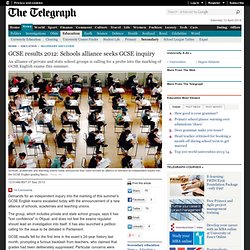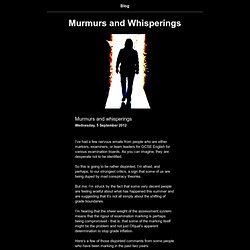

Highlights from today's Education Select Committee: Questions Answered & Ones Still Needing Answers. The Education Select Committee this morning asked for evidence from headteachers, union leaders and Ofqual over the unexpected grade boundary changes in the English GCSEs this summer.

On Twitter this morning many people criticised Glenys Stacey, Chief Regulator at Ofqual, for being dispassionate and talking more about statistics than the impact on children. But we must remember her job is being a regulator of an industry and a calm measurement-focus is entirely what her role demands. More important were the variability of quality in her answers and the questions that MPs left unasked. Below I review some of the highlights. **Some questions asked of Ofqual and the answers**: Given that TES Evidence shows Edexcel were asked to move grade boundaries, did you also influence other exam boards? Were the grade boundaries too harsh in June? GCSE results 2012: Schools alliance seeks GCSE inquiry. It could also damage students' university chances as many institutions ask for a C in GCSE English, regardless of A-level results.

Brian Lightman, general secretary of the Association of School and College Leaders (ASCL), said: "The row is essentially about fairness. It is wrong for pupils to be graded differently for the same exam. "Schools have not complained about the results in science – which dropped nationally by an even larger amount than English – because that process was seen as fair and transparent. " The alliance said it has "lost confidence in Ofqual and the awarding bodies and deplores the absence of timely action to resolve the injustice". "Moreover, the alliance does not feel that Ofqual could or should investigate itself. An Ofqual spokeswoman said: "We want to fully understand the concerns being raised by teachers, head teachers and their organisations about GCSE English. Murmurs and Whisperings. I’ve had a few nervous emails from people who are either markers, examiners, or team leaders for GCSE English for various examination boards.

As you can imagine, they are desperate not to be identified. So this is going to be rather disjointed, I’m afraid, and perhaps, to our strongest critics, a sign that some of us are being duped by mad conspiracy theories. But me: I’m struck by the fact that some very decent people are feeling woeful about what has happened this summer and are suggesting that it’s not all simply about the shifting of grade boundaries. I’m hearing that the sheer weight of the assessment system means that the rigour of examination marking is perhaps being compromised - that is, that some of the marking itself might be the problem and not just Ofqual’s apparent determination to stop grade inflation. Hippy days. The trouble with today - a bank holiday - may be that we all have too much time on our hands.

Certainly I regret spending three minutes reading through a woefully stitched-together patchwork of educational cliches by Max Hastings. I’d prefer to have been back at school on a wet break duty and would probably have learnt more about the real world. I’m also struck by this Twitter comment by @ethinking: what's happening is that teachers r compounding the image of being reactionary lefties dumbing the system down That may well be true. But if, as I’ve been arguing, the issue now is about moral leadership, then what leaders do is to take decisions even if they are unpopular and to stand up for causes even when they know they will be derided, sniped at, lampooned and stereotyped. That’s what we’re asking to happen now. GCSE uproar: 'my pupils have had their life chances damaged'
As a headteacher, I welcome the move towards increased rigour in examinations and as president of the Association of School and College Leaders have advised government officials as to how this can be achieved.

However what I cannot tolerate, together with hundreds of my colleagues, is unfairness and this is what we experienced last Thursday from the AQA exam board We had students crying on results day as they had failed to be awarded the grades my staff had advised them they were on target to achieve. I have colleagues in schools in more affluent areas where their students failed to achieve the higher grades predicted. This will mean they cannot study A-level English but will be able to access university for other subjects; however for my students this will mean a barrier to university. Woodside High is an 11-16 secondary school. Playing With Lives - English GCSE Analysis.
GCSE results 2012: How grades have fallen – graphic. Reaction to the drop has been varied.

Adrian Prandle, education policy adviser at the Association of Teachers and Lecturers, said: "There is unacceptable confusion today about whether so-called grade inflation has been banned and grade boundaries made tougher. Similarly shadow education secretary Stephen Twigg said "We need to understand why results have fallen in these subjects. Is it because of pressure from Ofqual to shift grade boundaries? "Concerns have been raised regarding the English GCSE in some quarters. As well as ensuring standards remain rigorous, we must ensure all pupils are treated consistently and fairly. " However, others defended the changes. "The quality of work required to achieve an A grade this year is the same as the quality of work required to achieve an A grade last year,” said Ziggy Liaquat, managing director of Edexcel.